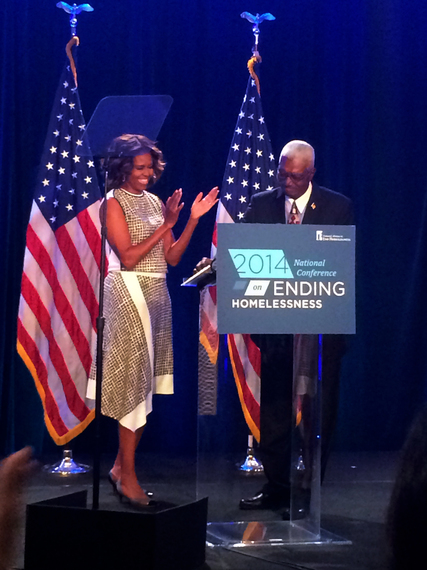All eyes were on First Lady Michelle Obama last Thursday when she entered the stage at the annual conference of the National Alliance to End Homelessness at Washington's Renaissance Hotel. Everyone stood as she walked toward Leon Drake, the Vietnam-war and OIF veteran who had introduced her, and gave him a hug.
There was so much simplicity and humanity in this gesture that nobody could fall short of being moved by it.
In her speech, in which she highlighted the current administration's progress toward ending veteran homelessness, she was sure to recognize the work done by some service providers in the country, including Friendship Place, where Leon rebuilt his life through Veterans First, a program funded through the VA's (Veterans Affairs) Supportive Services for Veterans Families Program.
As she spoke about her work with Jill Biden on the Joining Forces Initiative, she shared that she views veteran homelessness as a "stain on our soul" as a nation and pledged her commitment to end it.
The First Lady's visit was the culmination of three days of energizing speeches by national leaders that endowed the conference with a buzzing feeling, reviving hope among attendees.
Yes, the two years ahead will be tough, and, yes, we can do it!
NAEH (National Alliance to End Homelessness) President Nan Roman opened the first plenary session on Tuesday with her usual poise and vision. She highlighted some of the progress made through the new rapid solutions service providers are developing. Several workshops focused on these areas of growth in the field. She also conveyed a sense of urgency, looking ahead at the next two years as critical in the fight to end veteran and chronic homelessness.
This was echoed the next day by Laura Zeilinger, the new Executive Director of the US Interagency Council on Homelessness, as she pleaded with attendees to do their part at the local level.
In the wake of the excellent work done under Barbara Poppe, who harnessed the 19 federal agencies comprising the U.S. Interagency Council on Homelessness during her tenure, USICH is now off to finishing the job of ending homelessness.
This is no small task, indeed. And, Julian Castro, the new Housing and Urban Development Secretary, knew this as he addressed the crowd just three days after he took over for Sean Donovan, who has moved to the Office of Management and Budget.
Mr. Castro has pledged his support to the cause and brings with him valuable experience in affordable housing development from his home city of San Antonio. He challenged participants to change the way they work and reform ineffective programming, pledging changes at HUD.
New Jersey Senator Cory Booker brought the house down with his spirited speech that blended sobering observations on our society with aspirations of progress and harmony.
By the end of the day the crowd was walking on air, energized and ready to go back home to make things happen. Many would stop on Capitol Hill on their way to speak to their representatives about the needs in their own jurisdictions: "Hill Day" is a great feature of the conference.
The messages of the conference are simple, as usual:
- The next two years are incredibly important in the fight against veteran and chronic homelessness.
- All resources public and private will be needed and everybody has got to work together.
- Housing First is the fair way to work these days lest the system perpetuate "passive homicides," as Becky Kanis of the 100,000 Home Campaign put it, by leaving people in addiction behind to die on the streets.
- The crisis response system -- namely the shelters -- is a vital part of the overall system.
- The clock is ticking and everybody has to work faster to help people get housed.
And, with this in mind, the rapid solutions are now getting the attention they deserve with their potential to help a large number of people in three months or less.
So it was no surprise that rapid rehousing came into its own in Washington last week.

